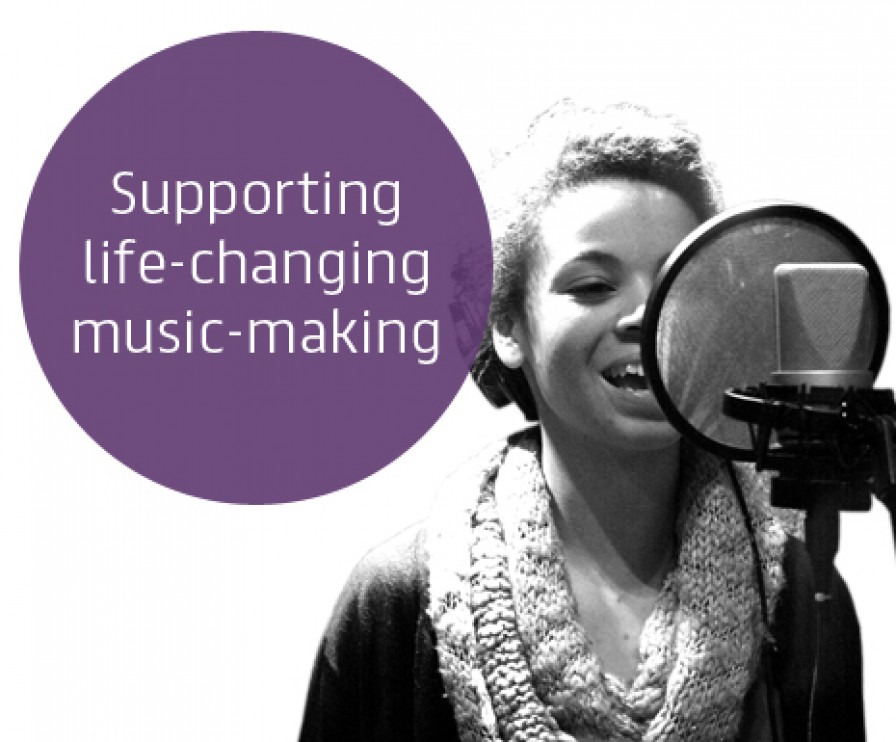Fresh Thinking for Music Education. What next?

Last month Youth Music was delighted to have 240 people join us for our first breakfast seminar: Fresh Thinking for Music Education. Guest speakers from outside the music education sector were invited to share their insights on young peoples’ music-making.
Despite a decrease in the numbers opting to take GCSE and A Level music in school, we know that young people are making and consuming more music than ever. We wanted to explore how music education is viewed from a young person’s perspective and how it might continue to satisfy curriculum needs, while at the same time accommodating the diverse ways in which young people engage with music outside the classroom.
Music industry speakers gave a fresh perspective
Our first speaker was Pete Paphides, acclaimed music journalist and critic. Pete asked how young musicians can be supported to develop their talents and develop sustainable careers. Who should be supporting them and how? While some bands like Pulp were able to draw upon the support of the state in their younger years, changes in the economic climate mean that this is no longer an option for many young people.
BBC broadcaster Jen Long stated that music education should be more than simply learning an instrument or singing in the school choir. In her view, music production, promotion, journalism and performing in a band are all viable music-related pathways which many young people today express an interest in pursuing. Jen wants to see a music curriculum that could prepare young people for a broader music-based career, as well as one that attracts more women into the industry.
As a former strategist for MTV and Last.fm, you could say Chris Price knows a thing or two about the way young people consume music. He highlighted the overwhelming impact of electronic dance music on popular music today and asked how this could be explored by a future music curriculum. He also queried the way young people learn and wanted to see music classrooms do more to accommodate learning through exploration rather than being ‘taught at’.
Common to all speakers’ presentations was the idea that all forms of musical expression and interests are equally valid. Music need not exist within a hierarchy, where one form is viewed as more valid or better than the other. Young people are more likely to follow a musical path successfully if it ignites their passion. Our role as music education professionals is to support young people on that journey, not to put down roadblocks and diversions as a result of our own biases.
It can be an uncomfortable experience when someone comments directly on our profession, particularly if that person does not have a relationship with us or is not fully conversant with our rationale for doing things a certain way. Similarly, when we work and move in the same circles day-in and day-out, it can sometimes be hard to challenge our assumptions and beliefs. The aim of this seminar was not to criticise music education and those working in it; rather, to bring a series of perspectives from speakers who are also passionate about music in order to instigate a fresh approach for how we support young people’s music-making.
Now it's time to get 'doing'
‘Thinking’ is an exercise with its own merits. But it has its limits. The ‘doing’ is where Youth Music now has its sights set moving forwards. Dealing with the current challenges in music education is not something that should or could be taken on by one organisation alone.
Collaboration and partnership among providers is key to the solution, but in doing so we need to address some difficult questions head-on, taking any negative feedback on the chin and addressing it proactively, rather than defensively.
So where next?
We were thrilled with the response to our first breakfast seminar and we plan to host more seminars tackling music education issues in the future, with the next one taking place in January 2014. Thank you to everyone who was kind enough to provide feedback, we are certainly keen to explore how we can continue to improve on what we have started.
Here at Youth Music we strongly believe that all players in the music education sector have something to learn from each other. This was highlighted in our recent research exploring ways in which a greater connection can be made between young people’s music-making both inside and outside of the school classroom.
We are currently implementing a fundraising initiative to create a national action research project to identify practical ways to bridge the gap between in-school and out-of-school provision. We are aiming to recruit partners in the near future to help us make this happen. So for now, please stay tuned.
Watch the videos here
Pete Paphides
Jen Long
Chris Price
Matt Griffiths
Discussion panel

